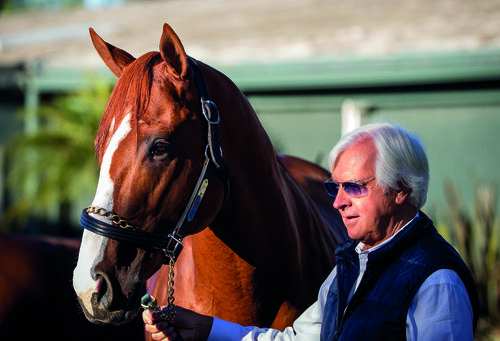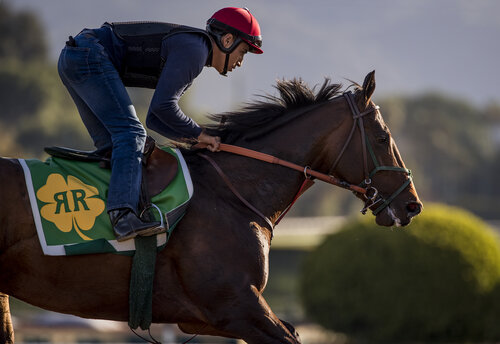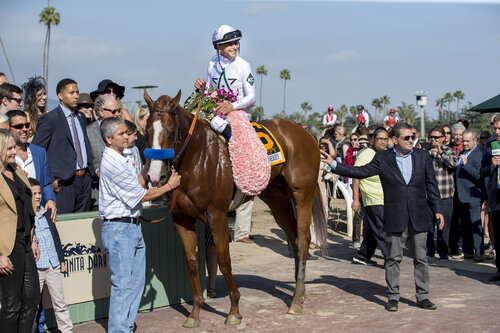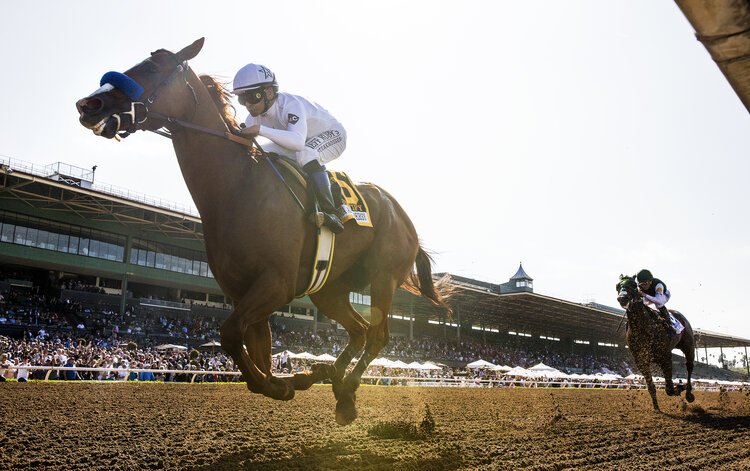Written by Peter J. Sacopulos Originally posted on: Trainer Magazine (June 15, 2020)
Justify’s victory in the 2018 Santa Anita Derby served as the springboard for trainer Bob Baffert’s second Triple Crown triumph. In the wake of a 2019 New York Times article revealing the colt had tested positive for a banned substance on race day, Ruis Racing has filed a lawsuit against the California Horse Racing Board. Ruis claims the CHRB failed to do its duty, and the 2018 victory and the $600,000 first-place purse rightfully belong to Bolt d’Oro.
A Duel at Santa Anita

As the starting bell sounded for the million-dollar Santa Anita Derby on April 7, 2018, folks who knew racing knew the contest was likely to come down to a duel between two horses: Bolt d’Oro and Justify. Both were big, beautiful and born to run. Bolt d’Oro, owned/trained by Mick Ruis and ridden by Javier Castellano, had experience on his side. Justify, trained by Bob Baffert, had only two races to his credit, but the handsome colt had won both and was already tagged as a rising star. A first- or second-place finish in Santa Anita would guarantee a spot in the Kentucky Derby, and Baffert, who had captured the Triple Crown with American Pharaoh only three years earlier, publicly hinted that his latest protégé could go all the way as well.
Baffert’s confidence seemed well placed when Justify, ridden by Mike E. Smith, took an early lead. Having firmly established themselves in second place, Castellano and Bolt D’Oro made their move in the final turn. With announcer Mike Worna describing the match as “prodigious talent versus established class,” Bolt d’Oro closed the gap and appeared ready to nose it out. But Justify sprang ahead in the final furlong, and prodigious talent won the day in an electrifying climax.
History in the Making
The rest, as they say, is history. Bob Baffert and Justify kept their string of victories going through a muddy Kentucky Derby, a foggy, rain-soaked Preakness, and a beautiful day at Belmont. Justify became the thirteenth horse to win the Triple Crown, and Baffert decked his already legendary status with fresh laurels. The trainer had chalked up an astonishing two Triple Crowns, five Kentucky Derbies, seven Preakness Stakes, three Belmont Stakes and three Kentucky Oaks.
Baffert had his eyes on The Grand Slam, but a problem with his superstar’s left front ankle led to the stallion’s retirement in late July 2018. Justify had earned $3,798,000 in six races. He followed Seattle Slew as the second winner in Triple Crown history to retire undefeated. Breeding rights were sold for a reported $60 million, plus a $25-million bonus for the Triple Crown triumph. Justify’s stud fee was reportedly set at $150,000.
A Stunning Revelation & Angry Allegations
Then, last fall, a dark cloud appeared above the green pastures of Justify’s retirement. On September 11, 2019, The New York Times ran an article headlined, “Justify Failed a Drug Test Before Winning the Triple Crown.” Racing journalist Joe Drape revealed what the California Horse Racing Board and the horse’s trainer and owners had managed to keep secret for over a year. Justify had tested over the acceptable limit for scopolamine on the day of his crucial victory at Santa Anita.
That would have been a bombshell in and of itself. But the article went on to detail a series of questionable actions by the California Horse Racing Board (CHRB) in the aftermath of the positive test. Actions that, in the eyes of many, defied logic, violated procedure, and made mockery of ethics and transparency. Some even claimed the governing body had violated California law.
Less than two weeks after the Times article appeared, California Governor Gavin Newsom publicly blasted the CHRB and the horse racing industry. “What happened last year was unacceptable, and all of the excuses be damned. We own that going into next season, and we’re going to have to do something about it,” Newsom told the Times. “I’ll tell you, talk about a sport whose time is up unless they reform. That’s horse racing,” the governor continued. He went on to excoriate the industry’s treatment of racehorses and warn that industries that don’t reform themselves get reformed by others.

BOLT D’ORO

TRAINER BOB BAFFERT IS INTERVIEWED AFTER WINNING THE 2018 SANTA ANITA DERBY.

JUSTIFY, RIDDEN BY MIKE SMITH, IN THE WINNERS CIRCLE AFTER WINNING THE 2018 SANTA ANITA DERBY.
A race becomes a case
In January 2020, Ruis Racing, which owned and trained Bolt d’Oro, filed a lawsuit in the California courts. The suit contends that, under the California rules for Thoroughbred racing, Justify must be disqualified from the 2018 Santa Anita Derby, Bolt d’Oro must be recognized as the race’s rightful winner, and Ruis Racing must be awarded the first-place prize money. ($600,000 vs. their $200,000 second-place purse.) The suit also claims that the CHRB knowingly violated statutes and procedures, and that Ruis Racing is entitled to compensatory damages and reimbursement for all legal costs incurred by the suit.
In the wake of the first Times article, Bob Baffert released a statement declaring that neither he nor his staff administered scopolamine to Justify prior to the Santa Anita run, or to any of his horses, ever. The statement said the substance had undoubtedly entered the horse’s system due to ingesting jimson weed—a natural source of scopolamine that can turn up in hay, straw and cereal grains. Baffert further stated that the CHRB had found no wrongdoing, that he had no influence over the Board or its decisions, and that Justify had tested clean in all of his other races.
Getting into the Weeds
Baffert’s statement correctly identified jimson weed as an environmental source of scopolamine. The chemical is a naturally occurring alkaloid found in noxious plants, including jimson weed. Invasive and aggressive, jimson weed is despised by farmers around the globe. Its defenses against nature’s plant-eaters include thorny seed pods, an unpleasant smell, and an extremely bitter flavor. Scopolamine not only contributes to the plant’s unappetizing taste, it adds toxicity. Though used in small amounts in human digestive remedies for centuries, modern medical experts consider jimson weed ineffective and unsafe, since ingesting the plant or its seeds can produce vomiting, seizures, muscle cramps and death. Its toxic effects extend to horses as well. …






